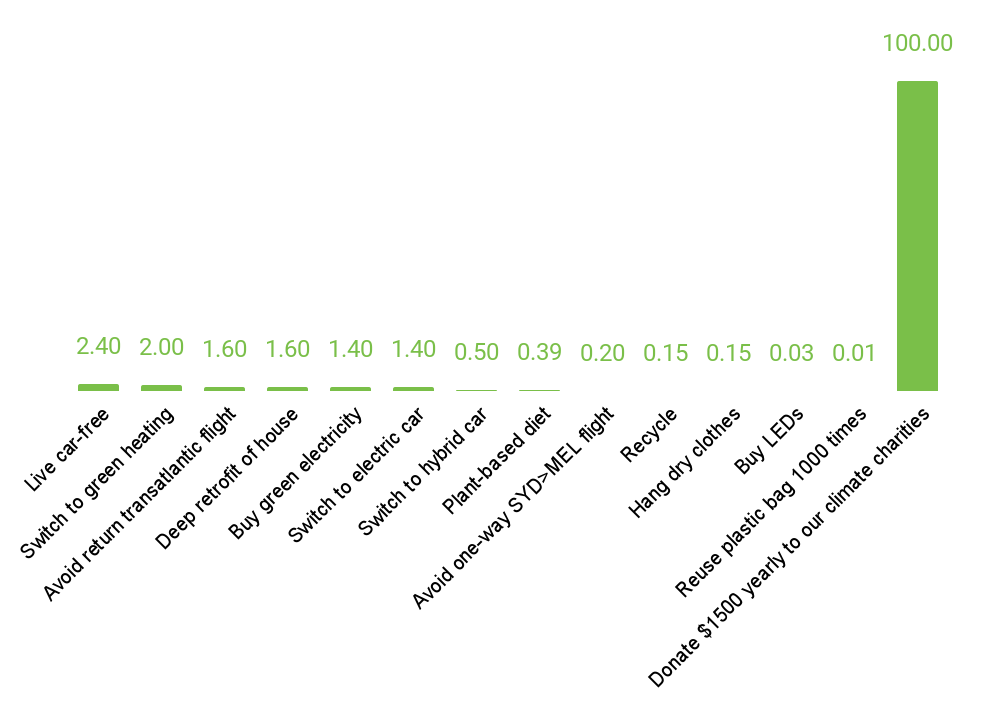When it comes to fighting climate change, many of us focus on tangible actions that are close to home, like recycling, eating less meat, or taking public transport.
But what if the biggest difference you could make came not from how you live—but where you give?
While lifestyle changes are important, recent research reveals that supporting systems level change can supercharge our impact on decarbonisation and reduce the worst effects of climate change.
Research from Founders Pledge reveals that donating to the most effective climate charities is likely the best way we can tackle climate change—with US$100 preventing 10 tonnes of CO₂ emissions, equivalent to flying 3-5 round trips from Sydney to London.

What makes a charity effective?
System level impact
When it comes to climate change, influencing policy is one of the most effective levers for creating systemic change. Governments control the regulatory landscape which both enables and constrains industrial developments, emissions, and energy consumption.
Supporting policy initiatives that push for stricter emissions standards and targets, and provide incentives for renewable energy and the development of new technologies to reduce emissions, can yield disproportionately large results.
Neglected solutions
When we think about climate solutions, renewable energy like wind and solar or scaling up adoption of electric vehicles, often come to mind. While these solutions are creating important pathways to reducing emissions globally, they will not be enough.
By focusing on climate solutions that are neglected or underutilised, there is the opportunity to shift policies, public awareness, and investment to gain the traction needed to rapidly reduce pollution and decarbonise economies.
Evidence-based
Evidence should be the driving force for action. To maximise the positive impact of an individual’s actions, making decisions based on high quality research and data is critical to ensuring that resources—time, money, and effort—are directed toward the most effective solutions.
Which climate charities are most effective?
Effective Altruism Australia works with two evaluation partners, Giving Green and Founders Pledge, which each perform rigorous research to identify some of the world’s most effective, evidence-based, high-leverage climate initiatives.
The charities identified by both organisations have been included in the Effective Altruism Australia: Environment Fund to make it easy for individuals to donate to the most effective climate charities.
Donating to Effective Altruism Australia’s Environment Fund is recommended as the best way to maximise your impact for reducing emissions and combating climate change. The fund currently includes three organisations we believe are having an outsized impact:
1. The Clean Air Task Force
The Clean Air Task Force is a U.S. based nonprofit organization that has been dedicated to tackling air pollution since its establishment in 1996. The Clean Air Task Force has an established track record of successfully influencing policy on zero-emission power solutions, methane emissions reduction and ‘hard to abate’ sectors like shipping and aviation. The Clean Air Task Force now works globally, operating in Africa and Europe.
Why it matters: The Clean Air Task Force focuses on reducing greenhouse gas emissions from ‘hard to abate’ sectors like power generation, heavy industries, and transportation. By addressing emissions from these sectors and advocating for underdeveloped technologies, the Clean Air Task Force has made real and lasting impacts of emissions reductions. This includes advocating for changes to the U.S. Environmental Protection Act, which contributed to the retirement of more than one-third of U.S. coal-fired power plant capacity over the past decade.
2. Opportunity Green
Opportunity Green is a UK-based nonprofit founded in 2021, that seeks to reduce emissions from aviation and maritime shipping through focused regulatory and policy initiatives. Since its inception, the organisation has worked to promote the adoption of clean energy alternatives, build coalitions and integrate the voices of climate vulnerable countries like Small Island Developing states (SIDS) and Least Developed Countries (LDCs) into international policy dialogues.
Why it matters: Aviation and shipping are two of the most neglected sectors in the climate conversation. In 2022, global shipping accounted for 2% of total global greenhouse gas emissions, while in 2023, aviation was responsible for 2.5% of total global greenhouse gas emissions. Combined, this is equivalent to the emission produced by the European Union in 2023. With emissions from both aviation and shipping set to increase over the coming decade, the work of Opportunity Green will be vital to build international cooperation, support infrastructure development for green hydrogen and upgrade technologies to reduce pollution.
3. Project InnerSpace
Launched in 2022, Project InnerSpace is a U.S.-based nonprofit that aims to accelerate the growth and uptake of geo-thermal energy around the world. As a source of carbon-free heat and electricity, geo-thermal energy holds immense potential to replace fossil fuels, especially in the Global South. Project InnerSpace is currently focused on identifying and mapping geothermal resources worldwide, providing crucial data to guide the development of new projects and breaking down barriers to investment to make geo-thermal a viable component of climate mitigation efforts.
Why it matters: Project InnerSpace’s focus on underutilised technology and enabling energy transition pathways for the Global South are critical for emissions reduction. Geothermal energy is one of the most reliable and sustainable sources of carbon-free energy. Unlike solar or wind, geothermal energy can provide constant, baseload power, meaning it isn’t intermittent and can work around the clock. These kinds of solutions will be critical to reducing emissions, particularly in Southeast Asia which is on course to account for 25% of global energy demand growth between now and 2035.
If you’re serious about reducing emissions and tackling climate change, consider acting where it counts most and making a tax-deductible donation to the Effective Altruism Australia Environment Fund today.





